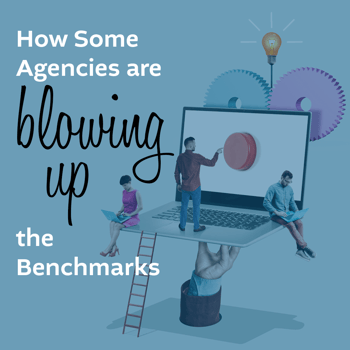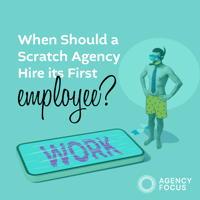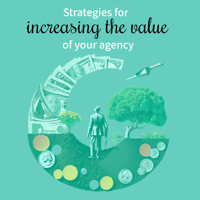When Should a Scratch Agency Hire its First Employee? As an owner, starting from scratch is one of...
Blowing up the Benchmarks
 There are several key benchmarks that independent insurance agencies use to measure their success. They include retention rate, sales velocity, profitability, and revenue per employee – just to name a few.
There are several key benchmarks that independent insurance agencies use to measure their success. They include retention rate, sales velocity, profitability, and revenue per employee – just to name a few.
In many cases, the historic metrics for each of these benchmarks are being redefined by agencies that are thinking differently about how the work within each role inside an agency is accomplished. Those that are able to rethink “the way we have always done it” at the task level are finding ways to drive efficiency, unlock capacity, and drive up the profitability inside their agency.
The core metric that measures efficiency is revenue per employee, and the following are some examples of how thinking differently is blowing up this metric. The revenue per employee ranges from $135K-$257K according to the 2022 Best Practices Study published by IIABA and Reagan Consulting. This metric varies based on the agency’s size, book of business makeup, staffing, technology, and infrastructure.
There are three main roles within an agency – sales, service, and administration. How can new metrics have impacts in each of these roles?
Sales Roles
Agencies that think through the tasks required to complete the sales process are identifying the repetitive tasks that can be automated, eliminated, or transferred to another person in order to increase the capacity and overall productivity of their producers. This includes the data entry that is required to set up a new customer in their system, data collection to quote a new prospect, appointment setting, and remarketing legwork just to name a few.
Leveraging technologies like InsurGrid to collect accurate policy data for prospects or utilizing virtual assistants to complete administrative tasks that are embedded in the sales process is a game changer. Utilizing commercial raters or tools like SALT to streamline the personal lines quoting process are all examples of how technology can drive efficiency into the sales process. Knowing what resources and technology will drive the best results for your agency is key, as it is not a one-size-fits-all but instead depends on your agency’s makeup.
Service Roles
Everyone knows that being responsive to our customer’s needs - especially in a claim situation - is critical to the success of any agency’s performance. Providing great service to customers is what drives high retention rates and customer satisfaction scores, so this is a huge area of need.
Leveraging tools like Ask Nicely that provide a Net Promoter Score and insights into which customers need extra time and attention to maintain a high retention rate is incredibly impactful for your service staff. As an agency, we want to be proactive in our efforts and this is one example of how to find ways to determine the best way to allocate our limited resources. Utilizing tools like Glovebox allows your customer to self-serve, access their insurance documents, and answer common service and administrative requests when they want to and how they want to. This improves the customer experience and also creates internal capacity.
Administrative Roles
Streamlining parts of the administrative process can be accomplished with RPA automation or bots to perform repetitive tasks such as downloading carrier reports, reconciling statements, and entering information into your agency management system. In situations with agency billed policies, solutions like Ascend can help automate labor intensive and costly financial operations such as collections, financing, carrier and commission payables allow agencies to operate without incurring large back office associated costs. It also reduces the chances of human error by relying on software to handle these repetitive and manual tasks while increasing the speed at which carriers are funded and commissions are received.
Rethinking these kinds of tasks can be most impactful as agencies grow and these costs build up (whether via hiring additional headcount to manage or through increases in external bookkeeper hours) as you sell more policies, eating away at your margins.
In every role inside an agency, there is an opportunity to think differently about how to go about completing specific tasks that are only small parts of each role but have a massive impact on the performance of the agency when you add up all of the time they require to complete those tasks. By removing, eliminating, and/or automating these types of tasks you will create the capacity to focus on the high-impact tasks that require expertise and drive performance, growth, and profitability inside the agency.
Agencies that are doing this have higher retention rates, growth, profitability, and revenue per employee metrics. In addition, they also tend to have higher staff retention. No one enjoys completing monotonous work, so identifying and minimizing those parts of the process can make a significant difference in the overall job satisfaction of your team.
Time is money.
There is no question about it, there are tasks inside every role that can be optimized. These are just a few examples of how thinking differently and utilizing technology, tools, and alternative staffing resources can have an incredible impact on the agency’s performance, capacity, profitability, and VALUE.
By talking to your staff to find out what tasks they do each and every day that are time-consuming, repetitious, and low impact, you can identify the right options for you to consider. Every agency is estimated to spend 60% of its time on administrative and repetitive tasks, reducing the time, and cost, and redirecting that time will change your performance, efficiency, and the value of your agency.



